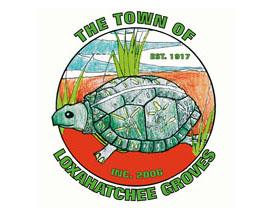The Loxahatchee Groves Town Council gave preliminary approval Nov. 5 to ordinances designed to fix issues that town staff and committees had found in the town’s Uniform Land Development Code.
Planning Consultant Jim Fleischmann said staff members wrote the proposed ULDC amendments at the direction of the council to create a more user-friendly special exception process for operations in agricultural, commercial and institutional/public facilities districts.
“Staff has worked closely with the ULDC Review Committee and the Planning & Zoning Board to develop the proposed code revisions,” Fleischmann said.
Staff had met four separate times with the ULDC committee, he said, and recommended approval of the proposed amendments in June with minor revisions, which were incorporated into the ordinance.
The Planning & Zoning Board recommended approval in September with three basic revisions: adding rodeo events as a special exception use, expanding the definition of temporary events and giving the town manager broader leeway to approve or determine what may be a special exception.
“As a result of staff’s working with the ULDC committee and the zoning board, we’ve pretty much arrived at a consensus of the town staff and the town’s committees as to what should be included in the proposed ordinance,” Fleischmann said.
In order to create a more user-friendly ordinance, there are now three categories of special exceptions based on potential impact to surrounding neighbors, with Category A having the most potential impact and Category C the least, Fleischmann said.
“We have also simplified the application and approval process, and we have revised the public notice requirements to reduce costs for property owners applying for special exceptions,” he said, explaining that the Category A uses would still go through the full special exception process.
Category B uses, which have less impact, would go through a modified special exception process to get approval more quickly and with less expense. Category C is for temporary events, which can potentially be approved by town staff as long as the activity does not exceed 24 hours.
He added that private, temporary events for family and friends of the property owner, on the owner’s property, that occur for no more than 24 hours, are no longer required to obtain special exception approval.
“That was something that the ULDC committee in particular wanted to make sure we include in here,” Fleischmann said.
He explained that Category A special exceptions will still be required to submit a site plan. “The way the code is now, all special exceptions have to prepare a site plan,” he said. “That’s part of the reason why the special exception process is so onerous at this point. Special exceptions are very costly to put together. Category A special exceptions, which are those that potentially have the greatest impacts, we feel should still go through that process.”
Category B special exceptions would still need to get a zoning confirmation letter from staff stating that all the requirements of the town’s land development code have been met. They must also supply a sketch or drawing of what they intend to do on the property.
Category C special exceptions only need to file an affidavit that the activity is not going to occur on the property for more than 24 consecutive hours.
“Category A is approval by council, Category B is authorization by the town manager with notification to the council, and Category C is essentially authorization by the town manager only,” Fleischmann said, pointing out that there is also a provision that a Category B special exception the town manager deems potentially excessive can be elevated it to Category A for full council review.
Fleischmann also noted that commercial equestrian operations in agricultural residential areas, which currently need special exception approval, would no longer be required. “The ULDC committee was pretty adamant of the fact that that should not require special-exception approval at all because it’s a bona fide agricultural use,” Fleischmann said.
Rodeo events, however, were determined not to be a bona fide agricultural use and were identified specifically as requiring special exceptions.
Fleischmann also noted that there were few special exception requirements for commercial and commercial-low zoning districts, and the few that did had been assigned a category. “We have ‘day labor hiring center,’ and ‘outdoor events,’ and that’s it,” he said. “We assigned Category A to day labor hiring center, and they need to get full special exception approval, and outdoor events get Category B.”
He also pointed out that institutional and public facilities districts special exceptions were also assigned categories, with outdoor events in Category B, private clubs or lodges in Category A and day labor hiring center in Category B.
Councilman Jim Rockett noted that Category C activities did not require giving notice to adjoining property owners. “Since that’s easy enough to do and it’s approved by the town manager, that would be a courtesy that I would expect we might want to do,” Rockett said.
Councilman Ryan Liang made a motion to approve the ordinance, adding the requirement that categories B and C have the same notice requirements, and it carried 4-0 with Councilman Tom Goltzené absent.
Mayor David Browning thanked the members of the committees for numerous hours they had spent going over the amendments.
The final reading and adoption is set for Tuesday, Dec. 3.





